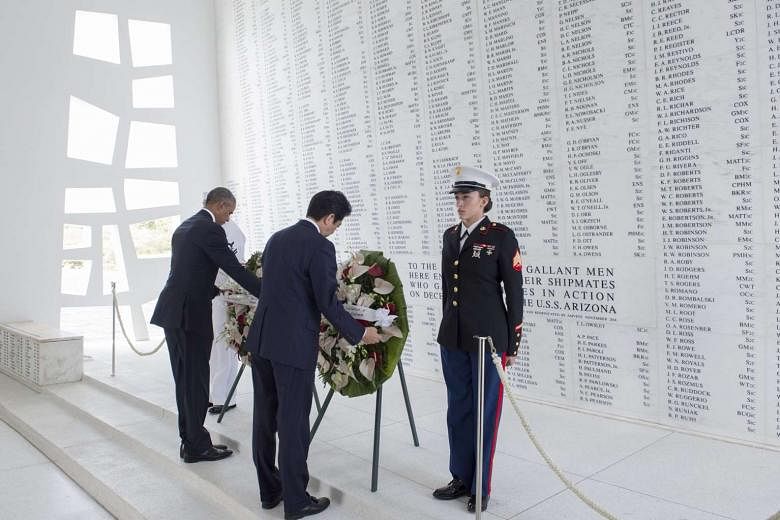TOKYO (AFP) - Japanese on Wednesday (Dec 28) hailed a historic visit by Prime Minister Shinzo Abe to Pearl Harbour, praising his message of reconciliation with the United States but wary of the future after Donald Trump takes office.
Interest in Abe's visit to the site of Japan's Dec 7, 1941 attack that drew the US into World War II has been high, with many favourably comparing it to President Barack Obama's journey this year to Hiroshima.
Both visits were highly choreographed and in their remarks - Obama in Hiroshima and Abe in Hawaii - neither apologised or even explicitly said their countries carried out the respective attacks.
But despite the careful words, the symbolism of their standing together again, this time at Pearl Harbour, was clear to most in Japan.
National broadcaster NHK provided live coverage of their joint address around 7am Japan time (2200 GMT Tuesday).
It was delivered after the two men visited the memorial to the battleship USS Arizona, sunk in the surprise Japanese attack 75 years ago this month.
Kuniyoshi Takimoto, 95, a former navy aircraft mechanic on a carrier that took part in the attack, praised Abe's words.
"It was a beautiful message that deeply reflected the sentiment of both American and Japanese people," he told AFP.
But Takimoto, while satisfied with Abe's words, was also critical of his hawkish policy to expand the role of Japan's military, including enabling combat missions abroad.
"The beautiful message has a catch," he said.
Shizuhiko Haraguchi, 95, a former Japanese sailor whose unit also took part in the attack, said it was moving to see the two together at the symbolic site.
"Watching that, I was overwhelmed," he told TV Asahi.
The focus on Abe's visit was slightly upstaged by one of his own cabinet ministers, who visited the controversial Yasukuni war shrine in Tokyo just hours after Abe went to Pearl Harbour.
Masahiro Imamura, minister in charge of the reconstruction of northern Japan after the massive 2011 tsunami, was quoted by public broadcaster NHK as saying the timing of his visit was "a coincidence".
But it may indicate some conservative frustration at Abe's decision to avoid visiting Yasukuni after his last trip there three years drew international criticism.
At Pearl Harbour Abe was also aiming to highlight the significance of close military and economic relations between the two nations, as Trump prepares to assume power amid major questions about his policies, several Japanese media outlets said.
Trump, during his campaign, accused Japan of not paying its fair share in supporting the military alliance, and suggested Tokyo could even develop its own nuclear deterrent.
Abe's speech also expressed Japan's deep appreciation for US aid to rebuild the nation after World War II.
It was designed to engage the US public who supported Trump, said commentator Takashi Ryuzaki.
"Rather than offering an apology, the message of gratitude for what America did after the war was expressed," he said on a TBS morning show.
The desire for a continued solid Japan-US relationship is what most Japanese, including Tokyoite Kazuko Masuda, 57, want.
"People killing people. That's war. That's why we must not do it again," she said.
"Mr Trump utters all those strong words... but I really hope he as an individual is the kind of person who walks an honourable path," she said.
Despite the generally positive reaction, some felt Abe did not go far enough.
"Considering many people died because of Japan's attack 75 years ago, I think the commemoration should have come with an apology," Koichi Kawano, 76, a victim of the Nagasaki atomic bomb, told the Mainichi Shimbun newspaper.
But Kiichi Yamada, who was passing by Yasukuni, said offering remorse was difficult for both Abe and Obama.
"The leaders might not have been able to express an apology even if they wanted to because of feelings that some people have in the respective countries," he told AFP.
"But I think, many Japanese people in their minds have an apologetic feeling for the attack."

